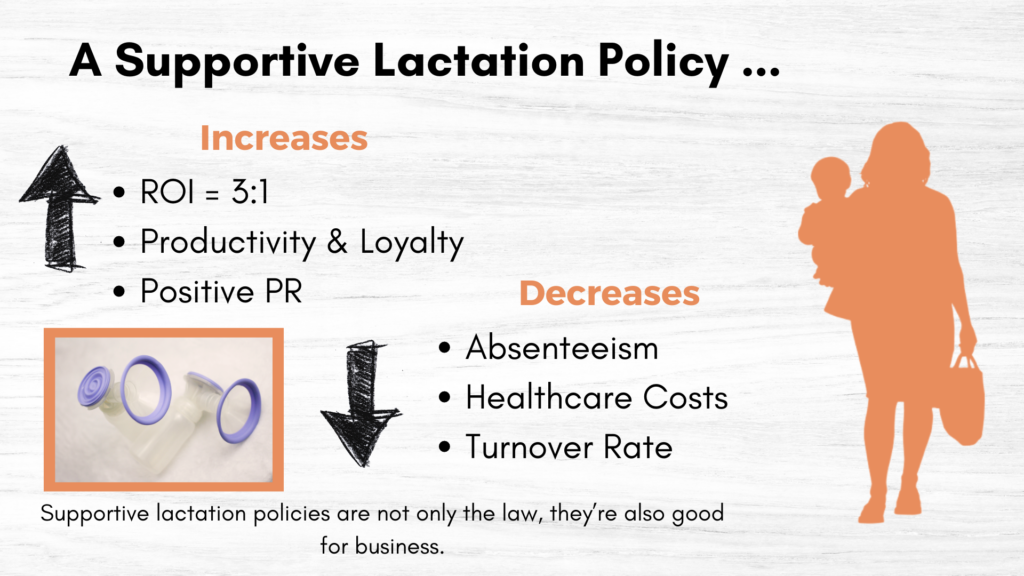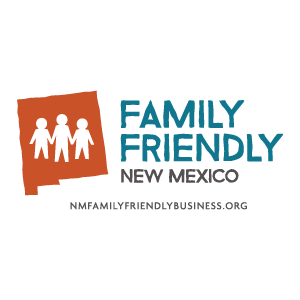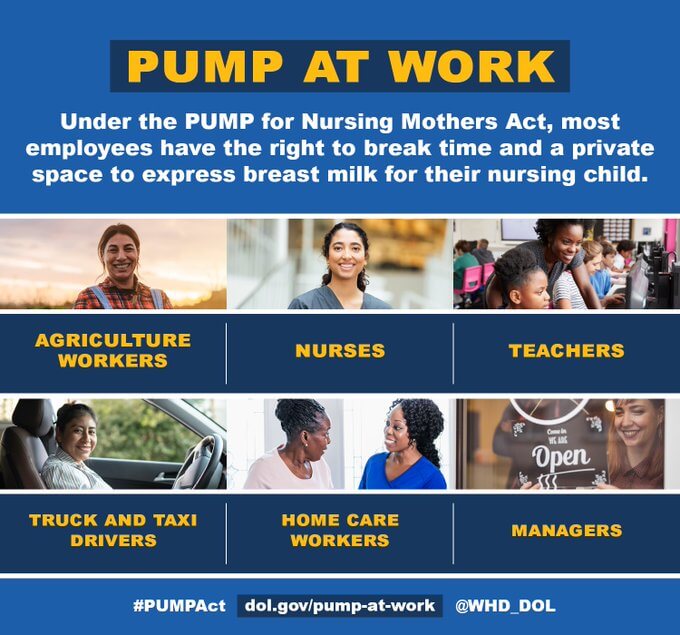This blog post is a summary of the Virtual Workshop hosted by FFNM: NEW Federal Protections for Pregnant and Breastfeeding Employees. It will cover the Providing Urgent Maternal Protections (PUMP) for Nursing Mothers Act. Please see this link to view the summary and overview of the Pregnant Workers Fairness Act (PWFA) portion of the workshop. A special thanks to Jessica Lujan, Core Team Representative at the New Mexico Breastfeeding Task Force for contributing to the workshop and this blog post!
The “PUMP Act” is a new federal law that went into effect December 2022, which makes several important changes to the FLSA Break Time for Nursing Mothers law. Below is a summary of important updates for employers.
The 2022 PUMP Act:
- Expands the legal right to receive pumping breaks and private space to nearly 9 million more workers, including teachers, registered nurses, farmworkers, and many others. These protections apply regardless of the employee’s gender.
- According to the U.S. Breastfeeding Committee, PUMP almost entirely closes the coverage gap that left 1 in 4 workers of childbearing age without federal protection of their right to break time and a private space to pump during the workday.
- Makes it possible for an employee to file a lawsuit against an employer that violates the law.
- Clarifies that pumping time counts as time worked when calculating minimum wage and overtime if an employee is not completely relieved from their work duties during the pumping break.
PUMP – What is a reasonable accommodation?
- If you travel for work: arrangements for time and space to pump while away from your normal workspace, including longer flight layovers, stopping over at airports with private lactation spaces, assistance securing private space while on the road or in facilities not owned by the employer.
- If you have a medical complication related to lactation, like mastitis: time off from work for treatment and recovery or another change that meets your needs.
- If you are not able to express enough milk using a pump: permission to have a caregiver bring the baby to your workplace for feedings.
- If your work involves exposure to pesticides, smoke, heavy metals, radiation or other toxins that could affect your milk: accommodations your doctor may recommend to reduce your exposure, like using protective gear (gloves, protective clothing or respirators), job restructuring, or temporary reassignment to a different position that is available.
- If you cannot perform your normal duties safely while lactating, like for example a security guard whose heavy and tight bulletproof vest would decrease their milk supply and put them at risk of infection: a temporary transfer to a desk assignment or job restructuring.
PUMP – Rules for employers
Employers cannot fire or otherwise penalize an employee for requesting lactation accommodations. Examples of “penalizing” include:
- Reducing hours
- Refusing breaks
- Reassigning to a less desirable location/shift.
Employers are liable for sexual harassment such as:
- Banging on the door of the room for pumping
- Vandalizing the door or room
- Name-calling
Please keep in mind that New Mexico law goes further than the federal PUMP law to protect lactation rights. New Mexico: Nursing Mothers’ Rights at Work states employers must provide nursing employees:
- Space for using a breast pump that meets all of the following:
- clean and private
- near the employee’s workspace
- not a bathroom
- Flexible break times
- An employee may continue to pump for their child beyond the first year
- All employees, regardless of their exempt (salaried) – or – non-exempt (hourly) status, are entitled to pumping breaks

Employers are not liable for:
- the storage or refrigeration of breast milk
- payment for a nursing mother’s break time in addition to established employee breaks
- payment of overtime while a nursing mother is using a breast pump
If you require additional guidance on how to comply with the PUMP Act, NMBTF is hosting a [FREE] virtual Lactation Policy Training on July 19, 2023 – Register at https://nmbtf.silkstart.com/events/nmbtf-workplace-training
The mission of the New Mexico Breastfeeding Task Force (NMBTF) is to create environments where breastfeeding is the cultural norm. Please contact them for FREE support with implementing a lactation policy in your workplace.
- Visit breastfeedingnm.org
- Call (505) 395 – MILK (6455)
- Email contact@breastfeedingnm.org
Additional Workshop Resources
 Jessica Lujan is a reproductive justice advocate, a community-based herbalist and queer farmer from northern New Mexico. She received a BS in Integrative Health Studies from Northern New Mexico College. In 2010, Jessica worked with Tewa Women United as a full spectrum doula, childbirth educator, certified lactation educator, and began to serve as the manager of the Indigenous Women’s Health & Reproductive Justice Program from 2015 through 2022. Jessica sits on the Board of Directors for the New Mexico Doula Association as Birth Equity Co-Chair and provides support for community & philanthropic organizations, as well as to care providers through her heart project, Colibri Corazon. She currently provides lactation advocacy, community organizing and support in her role as Core Team Representative through the NM Breastfeeding Task Force. Jessica resides in El Guique, NM with her family.
Jessica Lujan is a reproductive justice advocate, a community-based herbalist and queer farmer from northern New Mexico. She received a BS in Integrative Health Studies from Northern New Mexico College. In 2010, Jessica worked with Tewa Women United as a full spectrum doula, childbirth educator, certified lactation educator, and began to serve as the manager of the Indigenous Women’s Health & Reproductive Justice Program from 2015 through 2022. Jessica sits on the Board of Directors for the New Mexico Doula Association as Birth Equity Co-Chair and provides support for community & philanthropic organizations, as well as to care providers through her heart project, Colibri Corazon. She currently provides lactation advocacy, community organizing and support in her role as Core Team Representative through the NM Breastfeeding Task Force. Jessica resides in El Guique, NM with her family.


